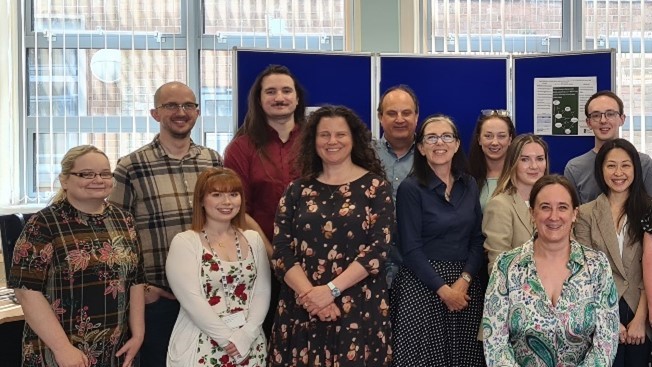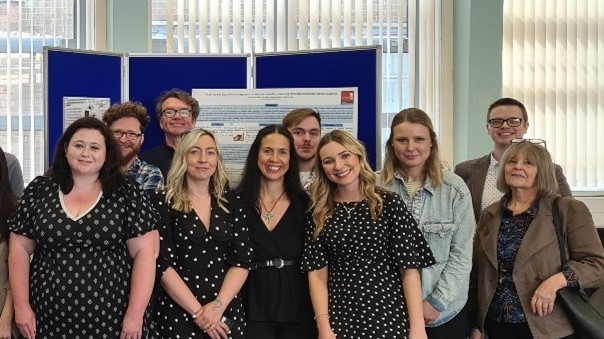Matthew Kimberly (Psychology PhD student) blogs about the third annual Keele-Staffs psychology postgraduate conference, with postscript from Dr Richard Jolley (PhD psychology course leader)
Following from the success of the first two joint conferences and a forced hiatus during the COVID-19 pandemic, the third joint Keele-Staffs psychology conference was hosted at Keele University in May 2022. The conference was organised by Dr Richard Jolley (Staffordshire University), Dr Sue Sherman (Keele University) with the help of a conference committee. The event offered an ideal opportunity for postgraduate researchers at both universities to network and share their research with an audience. It was also a great opportunity to practice their presentation skills in a supportive environment!
The conference commenced with an introduction from Professor Abigail Locke (Head of School of Psychology, Keele University) and Dr Richard Jolley. The first presenter in the morning session was Krystian Ciesielski from Keele University, who gave an informative overview of his research on whether visual information is used differently in functional and taxonomic scene categorisation. The second presenter was Tanya Schrader from Staffordshire University, who gave a dynamic talk about the dark side of conspiracy theory belief and how this may influence violence towards groups of people. Tanya was followed by Keele University’s Sebastian Nikolas Tustanowski, who discussed a study he was planning on the role of perceptual and cognitive factors (such as salience and consistency) on long-term memory of objects within a scene. Next, Darel Cookson from Staffordshire University discussed how social norm interventions may be used to reduce anti-vaccine conspiracy theory beliefs.
Following the morning presentations there was a short break before the Keynote speaker – Professor Lindsay O’Dell who is the director of the graduate school at the Open University. Lindsay reflected upon her own PhD journey – giving some wise tips for the PhD students – and then discussed some of the challenges she had experienced in a research project on disabled children and their families during the COVID-19 pandemic and how these were addressed.
Following the Keynote speaker, there was time for lunch, poster presentations and a group photo! Posters were presented by Sian Calvert (Staffordshire University), Iwan Dinnick (Keele University), Chloe Fahey (Keele University) and Chloe Pritchard (Keele University). Sian’s poster examined how social norms can be used to reduce unhealthy snacking in secondary school students. Iwan’s poster examined how characteristics of ingroup identity can reduce forgiveness of outgroup members. Chloe Fahey’s poster focused on the experiences of female sexual health services amongst individuals with autism. Chloe Pritchard’s poster examined public perceptions of child witnesses.


The afternoon session started with a presentation by myself discussing a recent study which examined the influence of relationship characteristics on the disclosure of sexual fantasies. The next talk was by Sonia Begum from Staffordshire University, who discussed some of the factors highlighted within her research to affect uptake and completion of Diabetes prevention programmes in the UK. Next Jamie Holmes from Keele University discussed a planned study examining the role of cognitive porousness in identity construction within players and characters within games such as Dungeons and Dragons.
In the final session Shwetha Davis from Keele University examined the experiences of teachers using trauma informed practices within educational settings. Next, Angela Bonner from Staffordshire University discussed how type 2 diabetes risk influences cognition. The final talk of the conference was by Stuart Moore from Keele University, who discussed how dimension switching can impair visual short-term memory resource allocation.
After Stuart’s talk, Professor Abigail Locke presented the prizes to the winners. Warm congratulations to Shwetha Davis for winning best talk presentation, Sian Calvert for winning best poster presentation and Stuart Moore and Iwan Dinnick for winning best open science research!
And finally a trip to the Keele Postgraduate Association (KPA) for a much deserved refreshment (or two!)
Matt Kimberley, PhD researcher
After the covid-enforced break from this joint postgraduate conference with the School of Psychology at Keele University I was delighted to offer this opportunity to our PhD students to present their research and network with fellow PhD students from our neighbouring institution. Furthermore, the talk from our external keynote speaker provided a very useful personal reflection on conducting research.
In the psychology the Staffordshire University we have around 10 PhD students. As a body of research scholars they provide a significant contribution to the Psychology Department’s research output, and more generally to our research culture. If you are reading this blog and are interested in studying for a PhD in the psychology department at Staffordshire University please get in touch with me for further information. We very much welcome applications.
Dr Richard Jolley
Associate Professor of Developmental Psychology and PhD Psychology Course Leader
Email: r.jolley@staffs.ac.uk
Interested in a Psychology degree? Come to an Open Day – for further details and to book your place at an open day please click here.





